一般现在时否定句,一般疑问句
小学一般现在时的句型转换
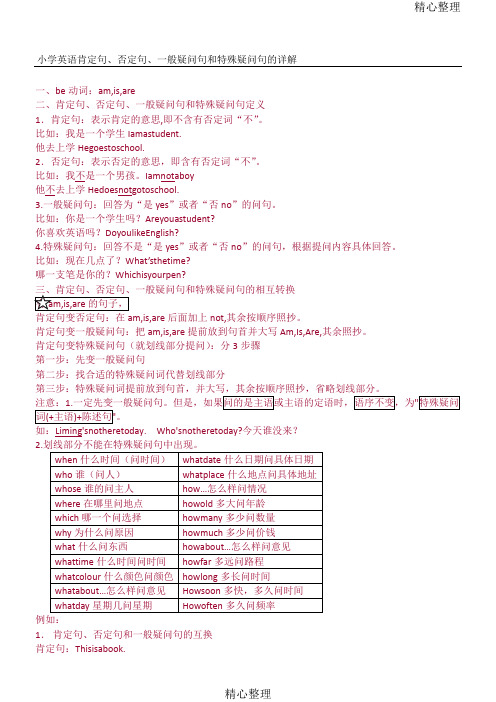
精心整理小学英语肯定句、否定句、一般疑问句和特殊疑问句的详解一、be动词:am,is,are二、肯定句、否定句、一般疑问句和特殊疑问句定义1.肯定句:表示肯定的意思,即不含有否定词“不”。
比如:我是一个学生Iamastudent.他去上学Hegoestoschool.2.否定句:表示否定的意思,即含有否定词“不”。
比如:我不是一个男孩。
Iamnotaboy例如:1.肯定句、否定句和一般疑问句的互换肯定句:Thisisabook.否定句:一般疑问句:Isthisabook?肯定回答:Yes,itis.否定回答:No,itisn’t.2.就划线部分提问(变特殊疑问句)Thisisabook.第一步:变一般疑问句Isthisabook?第二步:找合适的特殊疑问词Isthiswhat?第三步:特殊疑问词提前放到句首,并大写,其余按顺序照抄,省略划线部分。
Whatisthis?donot或者doesnot,其余按顺序照抄动词用原形do或者does并大写,其余照抄。
注意:动词用原形Wouldyoulikesomeorangejuice?与此相关的一些不定代词如something,somebody等也要进行相应变化。
2.and变为or。
如:Ihaveaknifeandar uler.→Idon'thaveaknifeoraruler.3.alotof(=lotsof)变为many或much。
如:Theyhavealotoffriends.(可数名词)→Theydon'thavemanyfriends.Thereislotsoforangeinthebottle.(不可数名词)→Thereisn'tmuchorangeinthebottle.4.already变为yet。
如:Ihavebeentherealready.→Ihaven't beenthereyet.小学英语肯定句、否定句、一般疑问句和特殊疑问句的转换练习一、就划线部分提问。
一般现在时态

在英语中,每句话都包含一定的时态,要学好英语就必须掌握英语中一些常用的时态。
在英语中,不同时间发生的动作和情况,要用不同的动词形式表示.这种不同的时间和不同的动词形式就叫做动词的时态. 换句话说,判断一个句子的时态,可以通过句子中的时间和动词的形态来判断。
下面我就一般现在时作一些讲解,如有不妥之处,请指教。
每种时态都有三个最基本的要素,分别是该时态的概念、结构、判断标志词。
一、一般现在时的概念:一般现在时表示现在经常反复发生的动作、存在的状态或习惯性的动作的时态。
二、一般现在时的结构:(有两类不同的结构)ⅠBe动词的一般现在时主语+be(am , is , are)+其它肯定句式:主语+be( am, is, are)+其它.否定句式:主语+be(am, is, are) +not +其它.一般疑问句:Be(am, is, are) +主语+其它?注:在这种构成中,be动词有人称和数的变化,即要根据主语选用am / is / are。
Be动词分为单数和复数,am和is是表示单数,am只跟I搭配(除了I其余的单数都用is),are表示复数。
Ⅱ实义动词的一般现在时①主语(第三人称单数)+动词(第三人称单数形式)+其它肯定句式:主语(第三人称单数)+动词(第三人称单数形式)+其它否定句式:主语(第三人称单数)+doesn’t+动词(原形)+其它.一般疑问句:Does+主语(第三人称单数)+动词(原形)+其它?②主语(除了第三人称单数)+动词(原形)+其它肯定句式:主语(除了第三人称单数)+动词(原形)+其它否定句式:主语(除了第三人称单数)+don’t+动词(原形)+其它.一般疑问句:Do+主语(除了第三人称单数)+动词(原形)+其它?注:do、don’t和does、doesn’t是构成一般现在时的助动词,其特点是要在其后跟动词的原形。
三、一般现在时的判断标志词often , usually , always , sometimes , at times , once a day , every + 时间四、动词的第三人称单数的构成规则和发音规则:1. 一般在动词后直接加上-s。
含有be动词的一般现在时否定句和疑问句的变化规律

含有be动词的一般现在时否定句和疑问句的变化规律一般现在时的否定句和疑问句的变化规律如下:否定句:在句子中加入否定副词“not”,并将be动词直接放在主语之后。
例如:She is not happy.(她不快乐。
)疑问句:将be动词提到句子的主语之前,并在句末加上问号。
例如:Are you ready?(你准备好了吗?)30句双语例句:1. She is not here.(她不在这里。
)2. Are you ready?(你准备好了吗?)3. He is not coming to the party.(他不来参加派对。
)4. Is she your sister?(她是你的妹妹吗?)5. They are not happy with the result.(他们对结果不满意。
)6. Are you from Canada?(你来自加拿大吗?)7. It is not a secret.(这不是个秘密。
)8. Are they your friends?(他们是你的朋友吗?)9. We are not going to the beach.(我们不去海滩。
)10. Is it cold outside?(外面冷吗?)11. The food is not delicious.(这食物不好吃。
)12. Are you a student?(你是学生吗?)13. She is not feeling well.(她感觉不舒服。
)14. Is he a teacher?(他是老师吗?)15. They are not listening to the music.(他们不听音乐。
)16. Are they watching a movie?(他们在看电影吗?)17. We are not happy with the service.(我们对服务不满意。
)18. Is it raining outside?(外面在下雨吗?)19. The cat is not sleeping.(猫没有睡着。
一般现在时肯定句疑问句否定句
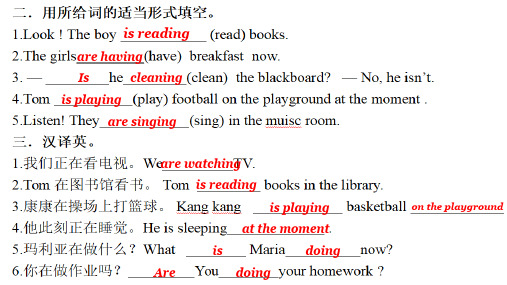
3. The girls dance after school every Tuesday.
__D_o__th_e__g_i_rl_s_d_a_n__c_e_a_f_te_r__sc_h_o_o_l_e_v_e_r_y__T_u_e_s_d_a_y_?_
is reading
are having
Is
cleaning
is playing
are singing
are watching
is reading
is playing
at the moment
is
doing
Are
doing
on the playground
are listening is watching is looking
- Yes, they ____d_o______.
把下列句子改成疑问句。 1. She plays the music on Wednesday.
__D_o_e_s_s_h_e__p_la__y_t_h_e_m__u_s_i_c_o_n_W __e_d_n_e_s_d_a_y__?_____
2. My father swims every day.
He goes fishing every day. 改为否定句 They usually feed the ducks in the park. 改为否定句 We often have a picnic on Sunday. 改为否定句
把下列句子改成否定句。 1. She plays the music on Wednesday. _________________________________________ 2. My father swims every day. _________________________________________ 3. The girls dance after school every Tuesday. __________________________________________ 4. He always takes photos. ____________________________________________ 5. My parent watches TV every day. ____________________________________________
一般现在时态讲解
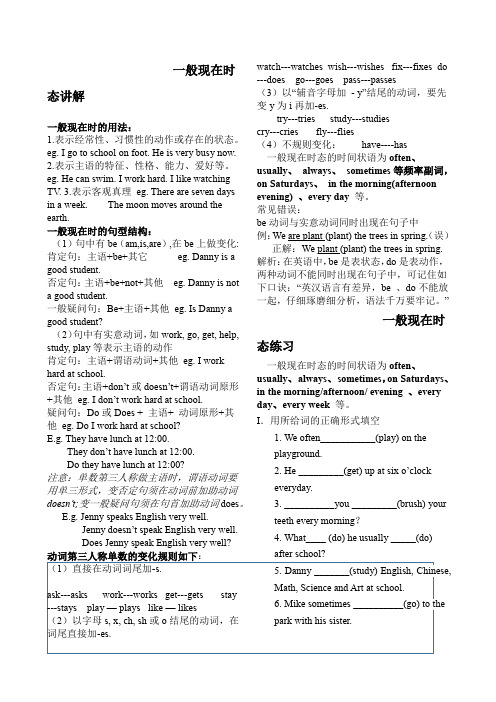
一般现在时态讲解一般现在时的用法:1.表示经常性、习惯性的动作或存在的状态。
eg. I go to school on foot. He is very busy now.2.表示主语的特征、性格、能力、爱好等。
eg. He can swim. I work hard. I like watching TV .3.表示客观真理 eg. There are seven days in a week. The moon moves around the earth.一般现在时的句型结构:(1)句中有be (am,is,are ),在be 上做变化: 肯定句:主语+be+其它 eg. Danny is a good student. 否定句:主语+be+not+其他 eg. Danny is not a good student.一般疑问句:Be+主语+其他 eg. Is Danny a good student? (2)句中有实意动词,如work, go, get, help, study, play 等表示主语的动作肯定句:主语+谓语动词+其他 eg. I work hard at school. 否定句:主语+don’t 或doesn ’t+谓语动词原形+其他 eg. I don’t work hard at school.疑问句:Do 或Does + 主语+ 动词原形+其他 eg. Do I work hard at school? E.g. They have lunch at 12:00.They don’t have lunch at 12:00. Do they have lunch at 12:00?注意:单数第三人称做主语时,谓语动词要用单三形式,变否定句须在动词前加助动词doesn’t;变一般疑问句须在句首加助动词does 。
E.g. Jenny speaks English very well.Jenny doesn’t speak English very well.watch---watches wish---wishes fix---fixes do ---does go---goes pass---passes(3)以“辅音字母加 - y”结尾的动词,要先变y 为i 再加-es.try---tries study---studies cry---cries fly---flies(4)不规则变化: have----has 一般现在时态的时间状语为often 、usually 、 always 、 sometimes 等频率副词,on Saturdays 、 in the morning(afternoon evening) 、every day 等。
一般现在时的构成、否定句、一般疑问句的构成
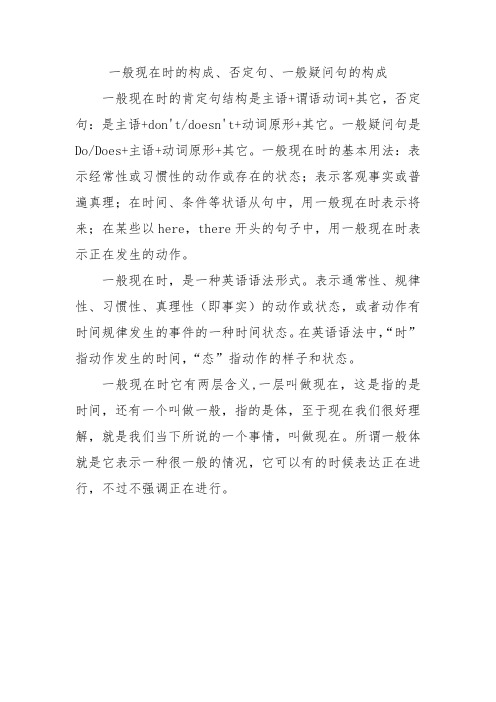
一般现在时的构成、否定句、一般疑问句的构成
一般现在时的肯定句结构是主语+谓语动词+其它,否定句:是主语+don't/doesn't+动词原形+其它。
一般疑问句是Do/Does+主语+动词原形+其它。
一般现在时的基本用法:表示经常性或习惯性的动作或存在的状态;表示客观事实或普遍真理;在时间、条件等状语从句中,用一般现在时表示将来;在某些以here,there开头的句子中,用一般现在时表示正在发生的动作。
一般现在时,是一种英语语法形式。
表示通常性、规律性、习惯性、真理性(即事实)的动作或状态,或者动作有时间规律发生的事件的一种时间状态。
在英语语法中,“时”指动作发生的时间,“态”指动作的样子和状态。
一般现在时它有两层含义,一层叫做现在,这是指的是时间,还有一个叫做一般,指的是体,至于现在我们很好理解,就是我们当下所说的一个事情,叫做现在。
所谓一般体就是它表示一种很一般的情况,它可以有的时候表达正在进行,不过不强调正在进行。
一般现在时第三人称单数、疑问句
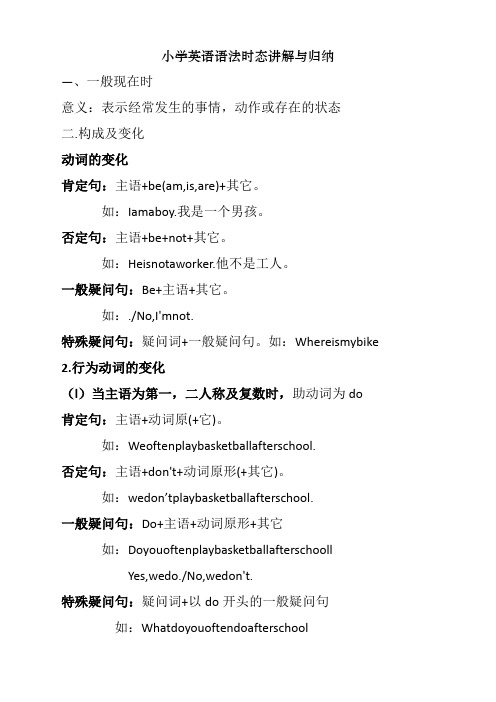
小学英语语法时态讲解与归纳—、一般现在时意义:表示经常发生的事情,动作或存在的状态二.构成及变化动词的变化肯定句:主语+be(am,is,are)+其它。
如:Iamaboy.我是一个男孩。
否定句:主语+be+not+其它。
如:Heisnotaworker.他不是工人。
一般疑问句:Be+主语+其它。
如:./No,I'mnot.特殊疑问句:疑问词+一般疑问句。
如:Whereismybike 2.行为动词的变化(l)当主语为第一,二人称及复数时,助动词为do肯定句:主语+动词原(+它)。
如:Weoftenplaybasketballafterschool.否定句:主语+don't+动词原形(+其它)。
如:wedon’tplaybasketballafterschool.一般疑问句:Do+主语+动词原形+其它如:DoyouoftenplaybasketballafterschoollYes,wedo./No,wedon't.特殊疑问句:疑问词+以do开头的一般疑问句如:Whatdoyouoftendoafterschool(2)当主语为第三人称单数时,助动词为does肯定句:主语+动词三单式(+其它)。
如:Heswimswell.否定句:主语+doesn’t+动词原形(+其它)。
如:Hedoesn’tswim well.一般疑问句:Does+主语+动词原形+其它。
如:DoesheswimwellYes,hedoes./No,hedoesn't.特殊疑问句:疑问词+以does开头的一般疑问句如:Howdoesyourfathergotowork三.第三人称单数的动词变化规则(只有在第三人称为主语的肯定句中,动词才用三单式)(1)多数动词直接加s:runs getslikescolletstakesplays climbs…….(2)结尾是s,x,sh,ch,o,前为辅音字母,结尾加es:watches teaches goes does washes crossesmixes brushes(3)动词末尾y前为辅音:将y改为i加es:study→studiesfly→fliescarry→carriescry→cries但在y前如果为元音则直接加s:buyssays四.时间标志:always,usually,often,so metimes,every…一般现在时练习Heoften (have)dinnerathome. DanielandTommy (be)inClassOne.We (notwatch)TVonMonday.Nick (notgo)tothezooonSunday.they (like)theWorldCupWhattheyoften (do)onSaturdaysyourparents(read)newspaperseverydayThegirl (teach)usEnglishonSundays.SheandI(take)awalktogethereveryevening.There(be)somewaterinthebottle.Mike____(like)cooking.They____ (have)thesamehobby.Myaunt____(look)afterherbabycarefully. Youalways______(do)yourhomeworkwell.I (be)’mstayinginbed.She (go)toschoolfromMondaytoFriday.LiuTao_____(do)notlikePE.Thechildoften_____(watch)TVintheevening. SuHaiandSuYang____(have)eightlessonsthisterm.-Whatday___(be)ittoday-It’sSaturdayWinter, spring, summer and autumn (be)seasons.Danny (take) off his T-shirt now.Today (teach) a science lesson.Jenny and I (live) in Canada.Jenny (want) to go to school in chinaLet me (help) youShe eats a sandwich(总是)Li Ming goes to school by bicycle(有时)。
一般现在时 第三人称单数、疑问句
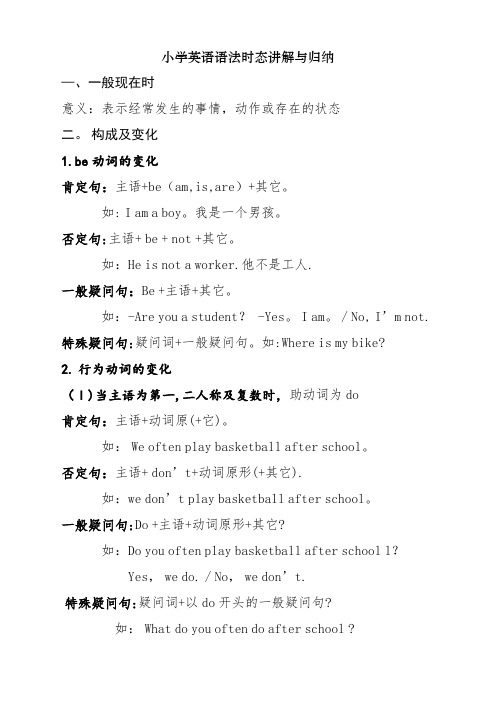
小学英语语法时态讲解与归纳—、一般现在时意义:表示经常发生的事情,动作或存在的状态二。
构成及变化1.be动词的变化肯定句:主语+be(am,is,are)+其它。
如:I am a boy。
我是一个男孩。
否定句:主语+be+not+其它。
如:He is not a worker.他不是工人.一般疑问句:Be+主语+其它。
如:-Are you a student?-Yes。
I am。
/No,I’m not.特殊疑问句:疑问词+一般疑问句。
如:Where is my bike?2.行为动词的变化(l)当主语为第一,二人称及复数时,助动词为do肯定句:主语+动词原(+它)。
如:We often play basketball after school。
否定句:主语+don’t+动词原形(+其它).如:we don’t play basketball after school。
一般疑问句:Do+主语+动词原形+其它?如:Do you often play basketball after school l?Yes,we do./No,we don’t.特殊疑问句:疑问词+以do开头的一般疑问句?如:What do you often do after school?(2)当主语为第三人称单数时,助动词为does肯定句:主语+动词三单式(+其它).如:He swims well。
否定句:主语+doesn’t+动词原形(+其它)。
如:He doesn't swim well.一般疑问句:Does+主语+动词原形+其它。
如:Does he swim well?Yes,he does。
/No,he doesn't.特殊疑问句:疑问词+以does开头的一般疑问句?如:How does your father go to work?三.第三人称单数的动词变化规则(只有在第三人称为主语的肯定句中,动词才用三单式)(1)多数动词直接加s:runs gets likes collets takes plays climbs…….(2)结尾是s,x,sh,ch,o,前为辅音字母,结尾加es:watches teaches goes does washes crossesmixes brushes(3)动词末尾y前为辅音:将y改为i加es:study→studies fly→flies carry→carries cry→cries但在y前如果为元音则直接加s:buys says四.时间标志:always,usually,often,sometimes,every…一般现在时练习He often (have) dinner at home.Daniel and Tommy (be) in Class One。
- 1、下载文档前请自行甄别文档内容的完整性,平台不提供额外的编辑、内容补充、找答案等附加服务。
- 2、"仅部分预览"的文档,不可在线预览部分如存在完整性等问题,可反馈申请退款(可完整预览的文档不适用该条件!)。
- 3、如文档侵犯您的权益,请联系客服反馈,我们会尽快为您处理(人工客服工作时间:9:00-18:30)。
1. I am a student.
I ____ ____ a student.
2. You are a good boy.
You _____ a good boy.
3. He is KangKang.
He _____ _____ KangKang.
4. We are workers.
We _______ ______ workers.
5. It is a nice cat.
It ______ a nice cat.
二.把下列句子变成否定句。
1. I have a book.
I ______ ______ a book.
2. We like English.
We ______ ______ English.
3. You go to school by bike every day.
You ______ ______ to school every day.
4. I come from China,
I _____ _____ from China.
5. They watch TV on weekends.
They _______ _______ TV on weekends.
1. Jane likes eating apples.
Jane _______ _______ eating apples.
2. He comes from England.
He ______ _____ from England.
3. She has a wide mouth.
She ______ ______ a wide mouth.
4. Tom plays computer game on school days.
Tom ______ ______ computer game on school days.
5. My mother goes to work by bus .
My mother ______ _______ to work by bus. 四.把下列句子变成一般疑问句。
1. I am a student.
____ ____ a student?
2. You are a good boy.
______ _____ a good boy?
3. He is KangKang.
_____ _____ KangKang?
4. We are workers.
_______ ______ workers?
5. It is a nice cat.
_____ ______ a nice cat?
五.把下列句子变成一般疑问句。
1. I have a book.
______ ______ _____ a book?
2 . We like English.
______ ______ ______ English?
3.You go to school by bike every day.
______ ______ _______ to school every day?
4. I come from China,
_____ _____ ______ from China?
5. They watch TV on weekends.
_______ _______ ______ TV on weekends?
六.把下列句子变成一般疑问句。
1. Jane likes eating apples.
_______ _______ ______ eating apples?
2. He comes from England.
______ _____ ______ from England.?
3. She has a wide mouth.
______ ______ _______ a wide mouth?
4. Tom plays computer game on school days.
______ ______ _______ computer game on school days?
5. My mother goes to work by bus .
______ _______ _______ to work by bus?。
